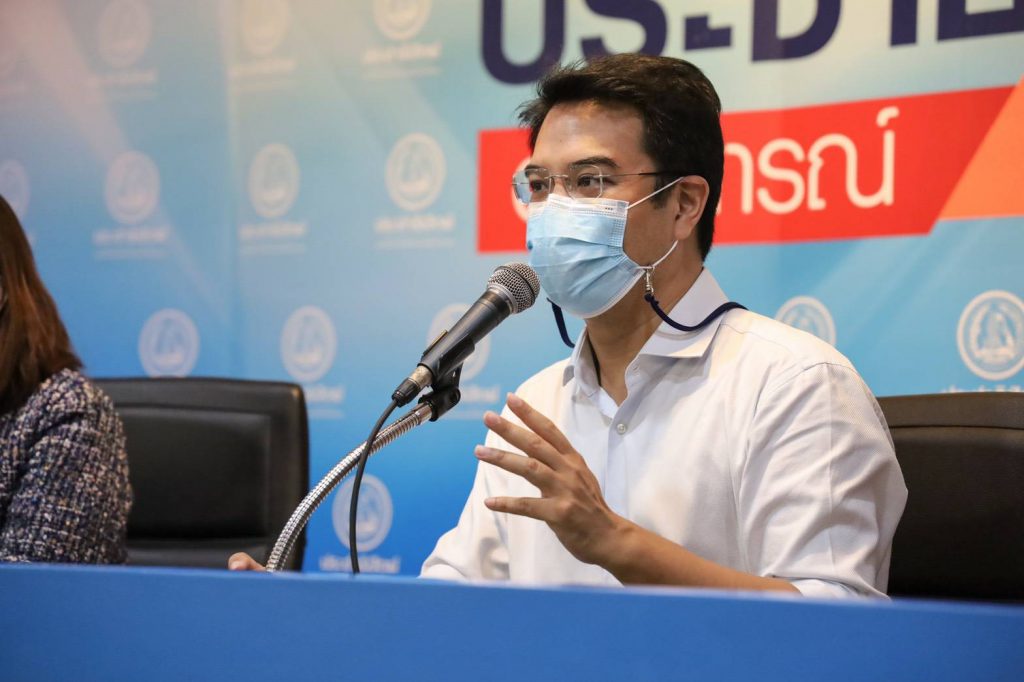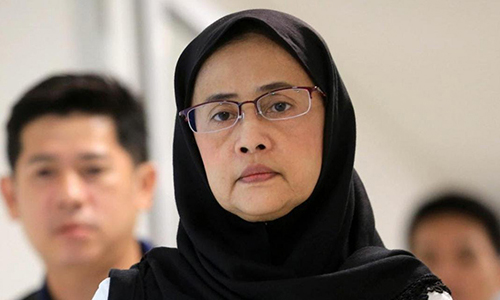
“…Addressing sexual harassment at the workplace is of paramount importance and should not be taken lightly. It stands in direct contradiction to the ethical standards expected of politicians. Political parties should educate or provide training to incoming members. Crucially, these parties must acknowledge the gravity of this issue and not show complacency in preventing such incidents….”
It has been more than a week since a large storm hit the Move Forward Party.
The allegations that two MPs from the party engaged in act of sexual harassment towards staff members and the party has initiated an investigation. During the initial meeting of the party's executive committee and the party's MPs, a resolution was reached to expel Mr. Wutthipong Thonglao, an MP from Prachinburi district. Additionally, a resolution was made to penalize Chaiyamparwaan Manpianjit, a Bangkok MP, due to insufficient vote to expel.

Chaiyamparwaan Manpianjit pic from https://twitter.com/chaiyamparwaan/photo
This has led to severe criticism, with some MPs accused of protecting Chaiyamparwaan due to their personal relationship.
Meanwhile, Chaiyamparwaan continues to visit his constituency, maintaining innocence and expressing readiness to involve a mediator or the Election Commission (EC) for an investigation. This stance has intensified the social media trend, placing added pressure on the Move Forward party.
The situation had escalated to the point where Chaithawat Tulathon, the party leader, has presented compelling evidence that Chaiyamparwaan had led a female team member, who had consumed alcohol, to a condominium where instances of sexual harassment occurred. However, Chaiyamparwaan has yet to take responsibility for these actions.
An urgent meeting was called during a seminar with the Move Forward Party's executive committee and MPs in Rayong Province on the 7th of November. The overwhelming consensus reached was in favor of expelling Chaiyamparwaan from the party, as previously proposed.
The intriguing aspect of this story lies in the occurrences of politicians facing allegations of sexual harassment, which extends beyond just the Move Forward Party.
Similar incidents have been reported in the past, including the case of Mr. Prinn Panitchpakdi, a former politician and the former Head of the Economic Team in an established party like the Democrat Party. Mr. Prinn Panitchpakdi is the son of a prominent figure in the party, Mr. Supachai Panitchpakdi, who previously led the blue party and served as deputy prime minister and minister on several occasions.
The case involving Prinn emerged in the news during mid-2022, with accusations of sexual abuse involving young women in at least 15 instances. However, he vehemently denies all charges and maintains his innocence. Subsequently, investigators summoned him for questioning and have now submitted the case file to the prosecutor for further action, possibly leading to a trial in the criminal court.

Prinn Panitchpakdi
Approximately one year has passed, and the Trial Court has provided a verdict sentencing Prinn to imprisonment in at least 3 cases, with a specific prison term of no less than 8 years and 8 months, all without suspension. Nevertheless, Prinn has requested bail and was released to contest the case in the appeals process.
Regarding the operations within the Democrat Party, despite Prinn resigning from all positions, including party membership, Mr. Jurin Laksanawisit — while serving as the Democrat Party leader — affirmed in an interview that the party would refrain from interfering in the judicial process. The party believes that the legal proceedings, which is considered a process that is acceptable in society, will unveil the truth.
A comparison of the mechanisms employed by the Move Forward Party and the Democrat Party to address internal issues reveals both significant similarities and differences.
Notably, the Move Forward Party has taken proactive steps, evident in its official endeavors to address the problem. Moreover, several female MPs have openly criticized and applied pressure, both through media channels and within the party.
Contrastingly, the Democrat Party appears to have swiftly diverted attention from this issue, allowing it to be solely within the purview of the justice process. The party's approach to handling internal issues related to this matter remains less conspicuous.
Instances of sexual harassment are not confined to MPs alone. Numerous other cases have surfaced including local politicians. A notable example from a few years back involved a member of the Bangkok Metropolitan Council from the Move Forward Party who faced accusations of sexual harassment, ultimately resulting in expulsion from the party.
However, the cases mentioned above merely scratch the surface, as there are many undisclosed incidents. Some instances may remain hidden, either due to attempts to shield the organization or because the victims feel ashamed or fear retribution, deterring them from reporting.

Angkhana Neelaphaijit
"The workplace should be a secure environment free from any form of sexual harassment."
This affirmation comes from Angkhana Neelaphaijit, former member of the National Human Rights Commission (NHRC) and ex-chair of the sub-committee on women's rights, during an interview with Isara News Agency (www.isranews.org),
Angkhana believes the penalties imposed by the Move Forward Party on two MPs accused of sexual harassment is acceptable, but the investigation was slow due to the claimed necessity of evaluating substantial documentation. There is a need for swift action. Swift resolution is crucial as it impacts the workplace well-being of women within the party or organization and influences the values of a party claiming to practice a new brand of politics.
“Addressing sexual harassment at the workplace is of paramount importance and should not be taken lightly. It stands in direct contradiction to the ethical standards expected of politicians. Political parties should educate or provide training to incoming members. Crucially, these parties must acknowledge the gravity of this issue and not show complacency in preventing such incidents. Precautionary measures previously mentioned should be strictly enforced. In cases of reported misconduct, accountability must be taken, including compensating the affected individuals. Regrettably, in the past, we haven't witnessed proactive actions from the Move Forward Party in handling such matters, for instance, the initial incident involving an MP physically assaulting a woman, eventually, the complaint was withdrawn, seemingly concluding the matter, despite it being an assault which constitutes a criminal offense. It's disconcerting that accountability processes for such MP remain uncertain," Angkana expressed concern.
Angkana explained that the issue isn't solely about holding the accused MP accountable; rather, it's about political parties collectively assuming responsibility. Parties should not only hold the accused individuals responsible but also provide compensation to the victims or those harmed. This is because parties select individuals, and the people choose parties.
"Political parties must bear accountability based on their principles in candidate selection. People's selection of a party is contingent upon the party's responsibility to recruit individuals with expertise, ethical conduct, and most importantly, those who advocate for gender equality and oppose sexism. When a party is in the process of selecting its members, it must articulate its values explicitly. Such occurrences should not be tolerated but rather may need to enact clear guidelines or regulations," Angkana emphasized.
Reflecting on potential solutions, Angkana recalled her tenure at the NHRC when she submitted a report on sexual harassment issues to the Cabinet in June 2015. The Cabinet resolved to acknowledge the problem, and a law was passed in the House of Representatives addressing this concern. However, to date, there has been a lack of evident enforcement.
"Some organizations or agencies merely display the Cabinet's resolution acknowledging the issue, without concrete actions. This reflects a lack of earnestness on the government's part regarding this critical matter. I urge all parties, including governmental, private, and political institutions, to exhibit greater vigilance," Angkana stated.
The question of whether political parties should take responsibility for their members in cases of sexual harassment requires more discussion.
For legislation for preventing sexual abuse, harassment, and disrespect, there are at least four laws of the land aimed at preventing sexual harassment or misconduct across political, public, and private sectors.
1. Gender Equality Act 2015: Enacted on March 13, 2015, this law establishes guidelines aimed at preventing and resolving issues of sexual harassment and harassment in the workplace. Notably, it is Thailand's first legislation that safeguards individuals with diverse sexual orientations which is in compliance with the ratification of the Convention on the Elimination of All Forms of Discrimination Against Women (CEDAW). However, Angkana points out that despite the requirement for government agencies to display this law in their offices, it has not been adequately discussed or implemented as intended.
2. Amendment to the Criminal Code for Sexual Offenses: This amendment, effective from May 19, 2015, introduced Section 397 which specifies penalties for actions such as bullying, intimidating, threatening, causing embarrassment, or annoyance. Perpetrators, including supervisors or individuals with authority, would face fines up to 5,000 baht or imprisonment up to 1 month or both.
3. Amendments to the Labor Protection Act (No. 2) B.E. 2008: These amendments prohibit employers, supervisors, inspectors, from subjecting employees to harassment, threats, or sexual harassment.
4. Ethical standards for judges of the Constitutional Court and those in independent organizations (B.E. 2018): Effective for MPs, Senators, Ministers, and others, this law explicitly defines sexual harassment in Section 20. It outlines the prohibition of actions that cause victims to suffer damages or impede their duties due to harassment or sexual harassment. Additionally, it forbids using one's sexual relationships to influence discretion in performing duties that may benefit or harm individuals.
This means that the politicians engaging in sexual harassment since at least January 30, 2018, when the ethical standards came into effect, complaints can be lodged with the National Anti-Corruption Commission (NACC) for investigation, akin to the previous complaints against two Move Forward Party MPs made by a whistleblower. Presently, the NACC is gathering basic facts. We need to continue observing the result.
Regardless of the outcome of this investigation and however it unfolds, these cases should serve as a significant starting point that prompts the political, public, and private sectors to prioritize and pay more attention to this matter.
Political organizations elected by the people should exhibit heightened awareness and greater accountability in incidents of such nature. They ought to demonstrate principles of efficient management under the umbrella of good governance. Perhaps it's time to enforce the law more rigorously and even declare it a National Agenda. Doing so could raise awareness among all citizens about their rights, gender equality, and the laws currently in place so as to prevent such incidents from recurring.


